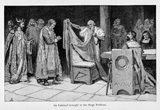

Did the Round Table really seat 1,600 men?
The introduction of the Round
Table can be traced to the French
monk Robert Wace,
who wrote Roman de Brut, a poem based on Geoffrey of
Monmouth's History of the Kings of Britain.
Wace says that Arthur's sat inside a
round table while Arthur sat on a dais, above the Round
Table. The idea here was that the knights were all equal but
Arthur was still the king. A few years later, an Englishman named
Layamon
tried his hand at the story, calling his work Brut.
(The idea of Brut comes from Brutus
the Trojan, whom Geoffrey says
founded the first kingdom in Britain.) Layamon identifies Arthur's court as
being at London, and places the king at the center of all
the action. In Brut, the Round Table is the result of
a chance meeting between Arthur and a Cornish carpenter, who
offers to make for the king a table that could seat 1,600
men and be folded up and taken anywhere. Now, the number 1,600 is fanciful. Wace
doesn't tell us how many knights sat inside the circle the
table formed. All subsequent Arthurian stories can be
classified as legends, not histories. So we are left with
1,600. See also Literature of the History – Wace, Layamon, and the Alliterative Morte Arthur Robert
de Boron starts the ball rolling
with the Round
Table, too, telling us how
Merlin
ordered Uther
Pendragon to construct the table
based on his vision of the Last Supper Table and
Joseph
of Arimathea's Grail Table.
Merlin instructed Uther to have the table accommodate 50
chairs; he also said to leave one chair blank, for the
knight who would fulfill the Grail Quest. The Vulgate Cycle
says the Round Table sat 250 knights.
The legend writers followed the
lead of the history writer Wace
in advancing the idea that the table was round to
promote equality in the ranks. The Vulgate Cycle
introduces the idea of the Siege
Perilous, continuing the
empty-chair theory but adding to it the caveat that
anyone not anointed would perish after sitting
there. Galahad,
of course, was the only one able to sit there; it
was he who fulfilled the Grail Quest. Robert says 50 knights sat at the table;
the Vulgate authors say 250. Each of these numbers suggests
a progressively larger table but nothing so big as that
suggested by Layamon,
a history writer. In Brut, we are told that the table
could seat 1,600 and be folded up and taken anywhere. Such a
fanciful story is not heard of in Arthurian histories.
Indeed, some scholars think that almost all of
Geoffrey
of Monmouth's History of the
Kings of Britain is made up. Yet, Layamon and Wace
before set out to tell the story of Arthur as a history.
Arthurian writers beginning with Chretien
de Troyes and continuing with
Robert de Boron, the Vulgate Cycle writers, and continuing
on through Malory,
Tennyson,
and the modern compliment, add their versions of the
legends. Did the Round Table really seat 1,600
men? Depends on whom you read and whom you
believe. See also Literature of the History – Wace, Layamon, and the Alliterative Morte Arthur

Was
Arthur a king or just a battle commander? Was
Guinevere really an adulteress? Was
Morgan Le Fay really a witch? Was
Morgause to blame for all of Arthur's
troubles?

Explorations in Arthurian History and Legends
Main
Page
Other
© 2000-2009 David White